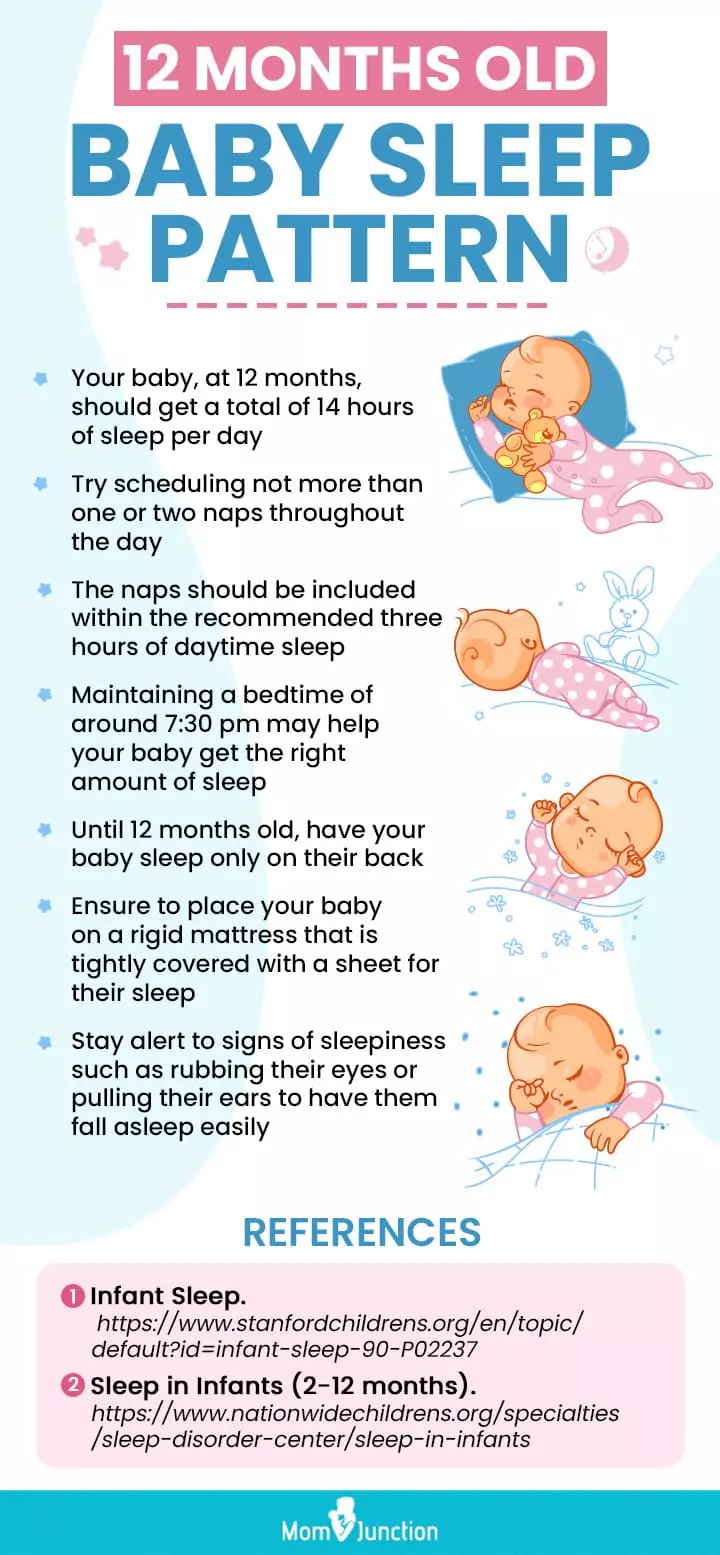
Image: ShutterStock
The exact cause of the 12-month sleep regression in babies is unknown. Most babies have frequent, unexplained sleep disruptions, called sleep regressions. Usually, the sleep regressions coincide with major brain developments. 12-month-old babies usually achieve or are on the verge of achieving milestones such as fine motor skills, including holding their toys, and gross motor skills, such as sitting up without support.
Many 12-month-old babies who previously used to sleep well may struggle to fall asleep or wake up in the middle of sleep during a sleep regression. In addition, parents may struggle to manage sleep regression since they have already gotten used to a little one who sleeps through the night. However, it is a temporary phase, and the baby eventually returns to normal sleep patterns.
Read on to know more about the causes and tips to manage 12-month sleep regression in babies.
Key Pointers
- The 12-month sleep regression is when the baby wakes up frequently from sleep and struggles to fall asleep at bedtime.
- Sleep regression is temporary, and in most babies, it subsides in two weeks.
- The 12-month sleep regression is likely the result of the rapid growth and development in babies at 12 months.
- The signs include difficulty falling asleep at bedtime, fussiness after waking up at night, and
longer daytime naps.
What Is 12-Month Sleep Regression?
The 12-month sleep regression is defined as an event when the baby displays a regressive trend in their nighttime sleep routine at or around the age of 12 months (1). Most infants sleep through the night as they grow older and could have 11 hours of nighttime sleep by 12 months (2). However, around or after the baby’s first birthday, parents may notice that the child wakes up frequently from sleep and struggles to fall asleep at bedtime. The baby may also grow restless when placed on the bed for sleep. These signs are indicative of baby sleep regression.
Sleep regression occurs at multiple ages during infancy and toddlerhood, such as at the ages of four months, six months, and eight months. No exact time range or duration can be predicted for sleep regression in a baby.
How Long Does 12-Month Sleep Regression Last?
Sleep regression is temporary. In most babies, the 12-month sleep regression subsides in two weeks. Sleep regression may depend on several factors, such as the baby’s sleep environment. Therefore, depending on the factors, sleep regression may last up to six weeks in some babies (3). If 12-month sleep regression extends beyond six weeks, consult a pediatrician.
What Causes 12-month Sleep Regression?
The 12-month sleep regression is likely the result of the rapid growth and development that babies display at the age of 12 months
. A 12-month-old will develop several essential skills, such as walking with support and saying simple words (4). The multiple changes in the body may affect body functions, including sleep.
The following are the various 12-month developmental milestones that may lead to sleep regression (5) (6) (7).
- Walking: Babies display high mobility around or after their first birthday. They pull to stand and walk with support. The newfound excitement to explore may cause sleep disturbances.
- Talking: A 12-month-old can say simple words and can respond to questions. You may observe them babbling, yelling, and even uttering small words or sentences, and these activities may carry on even during bedtime.

Image: Shutterstock
- Separation anxiety: A baby at 12 months is likely to display emotional attributes, such as nervousness around strangers and anxiety when parents leave. Separation anxiety peaks between the ages of 10 and 18 months. It may make it difficult for the baby to fall asleep when a parent is not in their line of sight. A 12-month-old who wakes up at night may not fall asleep again unless comforted by a parent.
- Change in daytime naps: By the age of 12 months, babies usually nap less frequently during the day. A 12-month-old is likely to nap for three hours during the day. The change in the total hours of daytime sleep may influence the nighttime sleep, causing the baby to develop sleep regression.

Image: Shutterstock
- Teething: The teething phase is marked by sore and inflamed gums. Baby teething can cause irritability and also disrupt their sleep.
What Are The Signs Of 12-month Sleep Regression?
The signs of 12-month sleep regression may vary among babies. The following are the common signs of sleep regression that parents may observe in their 12-month-old (1).
- Difficulty in falling asleep at bedtime.It is the most common sign of sleep regression. Babies may find it difficult to fall asleep and appear excited or energetic instead of calming down before bedtime. Some babies may cry and throw a tantrum if repeatedly coaxed by the parents to sleep.
- Fussiness after waking up at night. The awakened baby would find it difficult to fall asleep and would act fussy. They may also display clinginess and would only sleep when held by a parent.

Image: Shutterstock
- Longer daytime naps. Sleep regression may cause the baby to become sleep deprived, causing them to have longer daytime naps. Too much sleep during the day may make it difficult to sleep at night, thus causing a repeated sleep regression cycle.
Tips To Manage 12-month Sleep Regression
You may try the following sleep regression remedies and help your baby sleep better (8) (9).
- Track your baby’s sleep patterns. Parents should keep a log of their baby’s sleeping schedule, including daytime naps. Any changes in the sleep patterns can help identify the triggers and let you tackle them before the onset of sleep regression.
- Keep them active during the day. Parents should engage their babies in more daytime activities. These activities should be mentally and physically stimulating for the baby, so they can tire themselves to sleep at night.

Image: Shutterstock
- Maintain a fixed sleep routine. Place the baby to bed at the same time each night. Also, maintain fixed timings for daytime naps. It will help prepare the baby’s body for sleep. You may also observe a nighttime practice, such as a bath or reading a book, which can signal the baby that it is time to sleep.
- Avoid sudden changes in sleep routine. Once you establish a sleep routine for your baby, avoid making changes to it. If you expect disruption in your baby’s sleep patterns due to an activity, such as traveling, plan your baby’s daytime and nighttime sleep timings beforehand.
- Feed your baby adequately. Make sure the baby is sufficiently fed during the daytime to avoid any late-night hunger pangs.

Image: Shutterstock
- Manage separation anxiety. Comfort your baby to sleep in their crib and leave the room only when they have fallen asleep. If the baby develops sleep regression before the age of 12 months, you can consider room sharing up to the baby’s first birthday. Placing the baby’s crib in the same room as the parents can help them fall asleep sooner after nighttime awakenings.
- Try soothing methods. Place a night lamp in the baby’s room so that they do feel scared and anxious due to darkness during nighttime awakenings. You can place their favorite toy away from the baby’s bed but within their line of sight. You may also offer the baby a pacifier to calm them down to sleep.
- Teach the baby to self-soothe. There are several ways to teach your baby to self-soothe. The controlled crying method is one such method. Crying it out or the Ferber method has declined in popularity as concerns have been raised both about its efficacy as well as its long term effect on the child’s mental health.
During nighttime awakenings, avoid picking up the baby to soothe them. Instead it might be a better idea to comfort them while they remain in the crib.
Remember as far as sleep training is concerned, there is no correct way to do it – all babies are different and so are the circumstances in which they are growing up. Be patient. Be consistent. Train in a manner which is comfortable for you as well as the baby. It might seem difficult but it will eventually bring lasting results.
 Quick tip
Quick tipWhen To See A Doctor?
Sleep regression is a temporary event and seldom causes any adverse effects. Nevertheless, consult a pediatrician if the baby displays the following conditions.
- Sleep regression for more than six weeks
- Lack of growth
- Baby not gaining weight or sudden weight loss
- Abnormal breathing or snoring during sleep
- Significant changes in feeding and toilet habits
- Significant behavioral changes
- Loss of achieved developmental milestones
Frequently Asked Questions
1. Does sleep regression affect all babies?
Not all babies experience the 12-month sleep regression after their first year. Each baby adapts to a sleeping pattern as they reach their first year of life (10).
2. Is it alright to let the baby cry during sleep regression?
While it is difficult to see your baby cry, waiting a few minutes before trying to soothe them during a sleep regression is recommended. This delay in calming them could teach your baby to self-soothe and might make them fall asleep by themselves (10).
3. Are there any long-term effects of a 12-month sleep regression?
The 12-month sleep regression is a temporary phase generally not known to affect the baby’s health adversely. However, it’s essential to address persistent or chronic inadequate sleep as babies require sufficient sleep for proper brain and cognitive skills development. See medical guidance if sleep disturbances persist beyond the expected regression phase or significantly impact the baby’s well-being.
4. Is sleep regression a normal part of infant development?
Yes, sleep regression is a natural part of infant development. It occurs in stages as babies reach various developmental milestones and undergo changes in their sleep-wake cycles. Understanding these regressions can help parents navigate through them with patience and support (13).
5. How can parents tell the difference between sleep regression and other sleep issues in babies?
Monitoring the timing and age of sleep regression, analyzing the consistency and duration of symptoms, such as increased nighttime awakening or shorter daytime naps, and the change in the baby’s behavior, such as excessive irritability and fussiness, are some ways that can help differentiate between sleep regression and other sleep issues (13) (14).
6. Are there any risks associated with sleep regression in babies?
While sleep regression is a normal component of the baby’s development, persistent or chronic sleep interruptions may affect a baby’s physical, emotional, and neurological growth and development. Therefore, it is essential to differentiate between sleep regression and other sleep issues in babies and promptly manage sleep problems (13) (15).
Although exact reasons are unknown, 12-month old sleep regression can be due to the excitement of achieving major milestones in life. Babies develop gross motor skills and fine motor skills around 12 months. These events can stimulate their brain development, and they may show sleep regression. Usually, sleep regression is harmless. However, it causes inconvenience to parents or caregivers. Most babies grow out of sleep regression within a short period. Practicing bedtime routines and promoting naps could reduce the intensity and duration of sleep regression in most babies.
Infographic: Is Your Baby Sleeping Okay?
At 12 months old, it is natural for babies to experience interrupted sleep due to different changes in their bodies and developmental milestones. From the above information, it is clear that sleep regression is common and temporary. But amidst waking up and falling back to sleep, how do you ensure that your baby is getting enough sleep? This infographic will help you with that. Save it for your reference to understand the appropriate sleep patterns of a 12-month-old baby. Illustration: Momjunction Design Team
Learn how to help your child survive a 12-month sleep regression in this video with a sleep specialist. Get tips and advice on how to get your little one back to sleeping through the night.
References
1. 12-Month Sleep Regression;Sleep Foundation
2. Infant Sleep; Stanford Children’s Health
3. Christina Stolfo,Sleep Training; Northwell Health
4. Important Milestones: Your Child By One Year; Centers for Disease Control and Prevention
5. Milestones; Pathways
6. Separation Anxiety; Stanford Children’s Health
7. Your Infant is Teething; Children’s Hospital Los Angeles
8. How to Keep Your Sleeping Baby Safe; American Academy of Pediatrics
9. Pacifiers: Satisfying Your Baby’s Needs; American Academy of Pediatrics
10. 12-month Infant Sleep Regression; Sleep Foundation
11. Dealing With 12 Month Sleep Regression – Here are Ways to Help; Sleep Advisor
12. Understanding and Navigating Sleep Regressions; Penn Medicine
13. Typical sleep behavior (4) – toddlers 1 to 2 years; Better Health Channel
14. 12-Month Sleep Regression; Sleep Foundation
15. Infant sleep and its relation with cognition and growth: a narrative review; National Library of Medicine
Community Experiences
Join the conversation and become a part of our nurturing community! Share your stories, experiences, and insights to connect with fellow parents.
Read full bio of Dr. Pooja Parikh
Read full bio of Swati Patwal
Read full bio of Rohit Garoo
Read full bio of Vidya Tadapatri







 Things to know
Things to know















